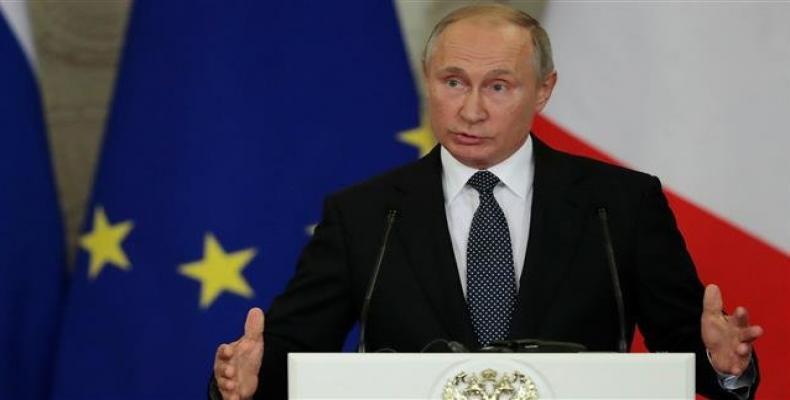Moscow, October 25 (RHC)-- Russian President Vladimir Putin has warned that Moscow will respond in kind, very quickly and effectively, if the United States decides to quit a landmark nuclear arms control pact.
U.S. President Donald Trump said on October 20 that Washington would withdraw from the Intermediate-range Nuclear Forces treaty (INF), which was signed towards the end of Cold War in 1987 by then President Ronald Reagan and Soviet leader Mikhail Gorbachev.
The treaty, seen as a milestone in ending the Cold War arms race between the two superpowers, banned ground-launch nuclear missiles with ranges from 500 kilometers to 5,500 kilometers and led to the elimination of nearly 2,700 short- and medium-range missiles.
"If the United States does withdraw from the INF treaty, the main question is what they will do with these newly available missiles. If they will deliver them to Europe, naturally our response will have to mirror this," Putin said at a joint press conference with Italian Prime Minister Giuseppe Conte after talks at the Kremlin in Moscow on Wednesday. He stressed that Russia’s response would be “very quick and effective."
Putin emphasized that scrapping a global arms control system was "very dangerous," adding Russia was concerned about the fact that Washington had already withdrawn from the Anti-Ballistic Missile treaty, planned to ditch the INF, and that the future of another key arms control agreement known as the New START was not clear. "There would be nothing left except an arms race," he said.
Experts warn that leaving the agreement could provoke a dangerous arms race across Europe, akin to the one that was unfolding during 1980, but was ended by the INF.
The Trump administration’s decision seems to be consistent with its foreign policy agenda, under which it has unilaterally scrapped the 2015 multilateral deal on the Iranian nuclear program as well as the Paris climate deal and the Trans-Pacific Partnership trade deal.
Kremlin Spokesman Dmitry Peskov said on Monday “Such steps [US quitting the deal], if they are undertaken, will make the world a more dangerous place.”
Trump’s decision has drawn criticism from China, with Chinese Foreign ministry spokeswoman Hua Chunying saying that it is wrong for the US to leave the treaty and that Beijing was opposed to the decision. Besides Russia and China, U.S. allies took turns to warn against the security risks the collapse of the INF could pose to Europe.
Germany has become the first U.S. ally to criticize the move, calling on the Trump administration to consider the consequences of such a move both for Europe and future disarmament efforts. French President Emmanuel Macron also held a phone conversation with Trump on the matter. “The president noted the importance of this treaty, in particular for European security and our strategic stability,” Macron’s office said of the call between the two leaders earlier this week.
The European Commission’s spokeswoman Maja Kocijancic stressed the need for keeping the treaty in place. “The U.S. and the Russian federation need to remain in a constructive dialogue to preserve this treaty and ensure it is fully and verifiably implemented,” she told reporters.
Russia will reciprocate if U.S. pulls out of INF nuclear treaty


